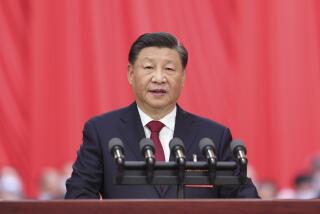Milestones in His Life
- Share via
Aug. 22, 1904: Born Deng Xixian into family of small landowning farmers in eastern Sichuan province.
1920: Sets sail for France. Studies in Bayeux in Normandy, then goes on to odd jobs around Paris and Lyons.
1923: Becomes professional Marxist revolutionary, working with the European branch of the Chinese Socialist Youth League. Joins the Chinese Communist Party in 1924.
1926: Leaves for Moscow, where he studies at the Sun Yat-sen University for Chinese revolutionaries. Returns to China 11 months later.
1927: Works as secretary on Communist Party’s central committee. Adopts nom de guerre Deng Xiaoping. Marries first wife, fellow party member Zhang Qianyuan, in Shanghai. Zhang dies after miscarriage.
1929: Sent to Jiangxi province to organize armed uprisings. Becomes secretary of county party committee.
1932: Marries Jin Weiying.
1933: First purge: demoted by leftist party leaders for his adherence to policies of Mao Tse-tung. Abandoned by wife.
1934: Joins Long March, contracting typhoid near the end.
1939: Marries third wife, Pu Zhuolin, by whom he has five children.
1947: Reaches apogee of military career: leads field armies in conquest of eastern and southwest China. Commands army in decisive victories over Nationalists, including in Yangtze River-crossing campaign.
1949: Following establishment of People’s Republic, is appointed mayor of Chongqing, near his birthplace.
1952: Reaches first apogee of political career, ranking sixth in party hierarchy.
1966: Second purge: deprived of all posts and, along with President Liu Shao-chi, publicly denounced at mass rallies as a “capitalist roader.” Exiled to rural Jiangxi three years later, he worked as a lathe operator and tended garden.
1973: Rehabilitated to Politburo and named deputy premier by Chou En-lai. Becomes army chief of staff in 1975.
1976: Third purge: sacked by party central committee for his criticism of Maoist excesses. Flees to south.
1977: Reinstated to civilian and military posts, again becoming deputy premier and secretary general of party.
1978: At party congress, shifts China’s main task from class struggle to economic development. After attacks on his leadership, turns on Democracy Wall movement. Movements’ leaders arrested.
1979: Presides over abortive, costly invasion of Vietnam, intended to punish Hanoi for invading Cambodia.
1981: Proposes reunification with Hong Kong and Taiwan under “one country, two systems” rubric.
1984: Guides negotiations with Britain for the return of Hong Kong to Chinese sovereignty.
1989: Resigns from major civilian and military posts. Condemns Tiananmen Square protests.
1992: On tour of south, calls for faster economic growth and development of “socialist market economy.” Says main political threat comes from leftists.
1994: Last public appearance. Shown on national television, looking frail and leaning on the arm of his daughter, at a Shanghai celebration of the Lunar New Year.
Compiled by ANTHONY KUHN / Los Angeles Times
More to Read
Sign up for Essential California
The most important California stories and recommendations in your inbox every morning.
You may occasionally receive promotional content from the Los Angeles Times.













